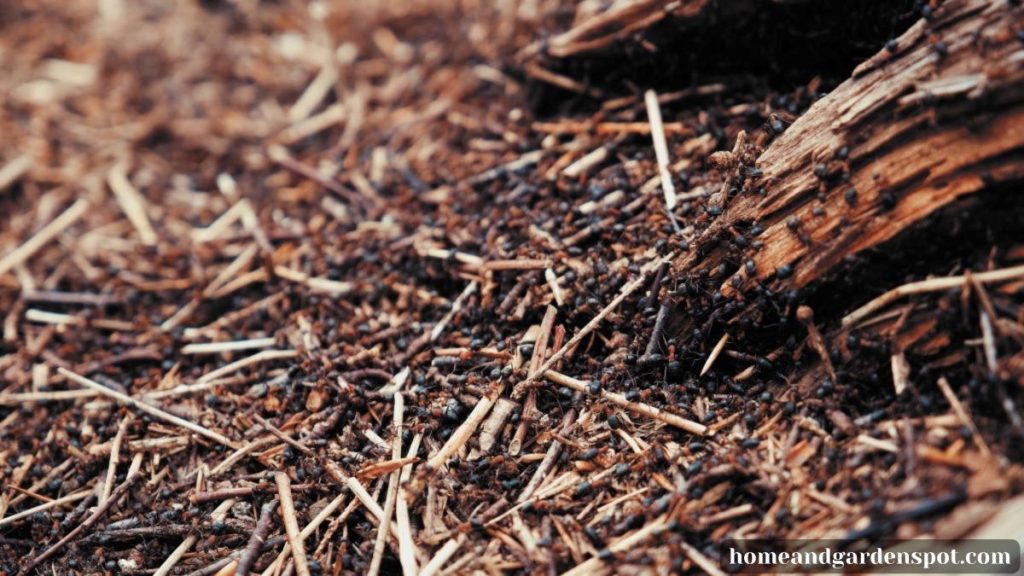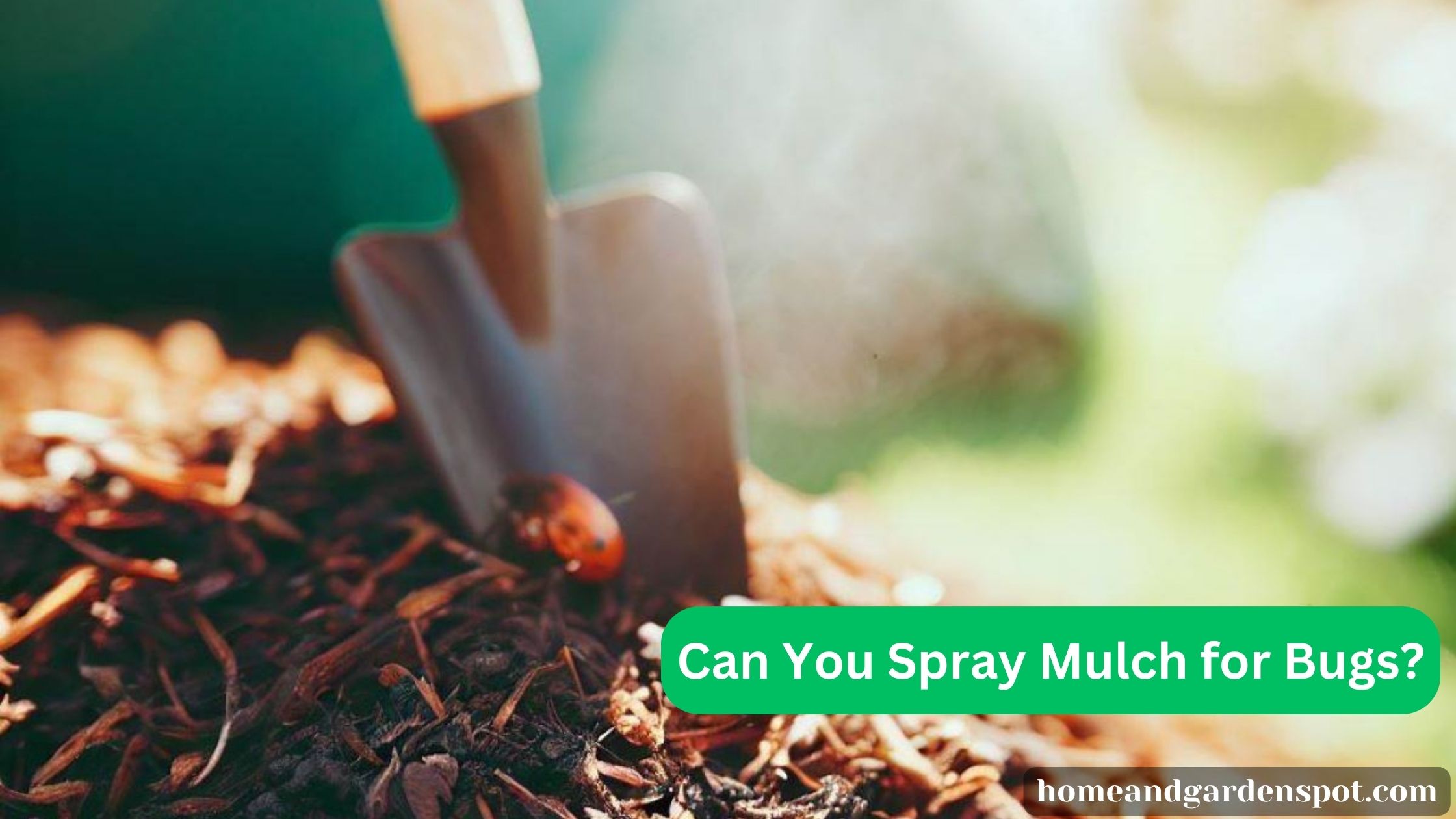Mulch is a common material in landscaping. It covers soil around plants, serving different purposes. It keeps the soil moist, stops weeds, and makes garden beds look better.
But, one issue that can arise when using mulch is the presence of bugs or pests. These bugs harm plants, spread diseases, or bother outdoor areas.
In this article, I’ll let you know if you can spray your mulch and how to prevent these bugs.
Can You Spray Mulch for Bugs
Yes, you can spray mulch for bugs with insecticide, water, or vinegar. Insecticide kills or repels bugs, water flushes them out, and vinegar deters them.
It’s vital to manage bugs in mulch for a healthy and good-looking garden. Ants, termites, aphids, and beetles can harm plants.
They may dig into the mulch or get into nearby structures if not handled
How to Spray Bugs In Mulch
1. Spray With Chemical or Natural Insecticide
To get rid of bugs in your mulch, use products with pyrethrin, neem oil, or diatomaceous earth. These ingredients help kill or repel the bugs. Follow the instructions on the label and apply the insecticide over the mulch. Be careful not to harm beneficial insects or pollinators.
2. Spray With Water
You can use a hose or sprinkler to spray water over the mulch. This can help flush out bugs and discourage them from nesting in a moist environment. But, this may also wash away some of the nutrients from the mulch and cause erosion.
3. Spray With Vinegar
You can mix one part of white vinegar with three parts of water and spray it over the mulch. This can help deter ants, slugs, and other pests that dislike acidic conditions.
But, vinegar can also lower the pH of your soil and affect your plants’ growth. Use this method sparingly and test it on a small area first.

How To Get Rid of Bugs in Your Mulch Garden
You can remove bugs from your mulch garden in different ways. It depends on how you like to garden and if you’re worried about using bug-killing sprays. Here are several methods you can use:
1. Spray with Chemical or Natural Insecticide
● Chemical Insecticide: Pick a proper chemical insecticide. Follow the instructions on how to apply from the manufacturer. This involves spraying the mulch surface. Be sure to wear appropriate protective gear.
● Neem Oil: Neem oil is a natural alternative that is effective against many garden pests. Mix 1 teaspoon of neem oil with 4 cups of water and add a drop of liquid dish soap. Spray the mulch and affected areas, ensuring you target the insects. Neem oil is generally considered safe for beneficial insects like bees and earthworms.
2. Remove and Treat Mulch
● Remove the mulch using a shovel and spread it thinly on a tarp.
● Spray the mulch with your chosen insecticide or neem oil.
● Put the treated mulch back in the garden. Leave a one-inch gap around plant stalks.
3. Switch to Inorganic Mulch
● Think about using rubber or pebbles for flower beds instead of natural mulch. These materials are less attractive to insects.
● Don’t use rubber or plastic mulch in veggie gardens. Chemicals might get into the soil over time.
4. Plant Insect-Repelling Flowers
● Cultivate flowers known for their natural insect-repelling properties. Some examples include chrysanthemums, geraniums, lavender, and marigolds. These plants emit scents that many insects find unpleasant or avoid.
●Plant these flowers in your garden beds. Put them between rows of vegetables. This helps cut down on pests in the mulch and on your plants.
5. Attract Birds to Your Garden
● Birds naturally eat many garden pests, helping to manage bugs in the area.
● Place birdhouses, bird feeders, and birdbaths in your garden to attract birds.
● Birds scratch and peck in mulch for insects. This helps control bug populations.
5 Tips to Prevent Insect Infestations in Your Mulch
1. Choose the Right Mulch Material
Selecting the appropriate mulch material is the foundation of insect prevention. Pick inorganic mulch like rubber, pebbles, or landscape fabric. They won’t attract bugs, unlike organic mulch. If you go for organic, try pine straw or cedar chips; pests find them less inviting than wood-based mulches.
2. Keep Mulch Dry
Insects, especially ants and termites, are drawn to moisture. Water your garden, but be cautious not to overwater the mulch. Use soaker hoses or drip irrigation to water plants at the roots without making the mulch too wet.
3. Regularly Inspect and Maintain
Periodic inspections are crucial for early detection of insect activity. Look for nests, trails, or any signs of damage to plants. If you see problems, fix them. Take away the bad mulch or plants and use the right treatments.
4. Practice Garden Hygiene
Keep your garden and mulch beds clean by clearing away debris, fallen leaves, and plant litter. These materials can offer hiding places for pests. Additionally, cut weeds, as they can act as alternate hosts for insects.
5. Rotate Mulch and Refresh as Needed
Rake and fluff your mulch. This disturbs insect homes, exposing them to natural predators and the weather. Think about swapping out old mulch for new stuff each year or when needed to stop bugs from piling up.
Conclusion
Finally, you can spray mulch for bugs. Different bugs and mulches may need specific insecticides or natural alternatives.
Mulch is helpful for gardening, but it can attract bugs harmful to plants or homes. To prevent bugs, choose mulch carefully, apply it right, and maintain it regularly.

Leave a Reply